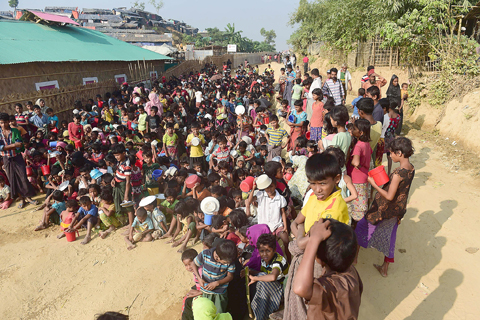Rights groups raise concerns over resettlement
 UKHIA: Rohingya refugee children wait for food at a food distribution center in Thankhali refugee camp in the Bangladeshi district of Ukhia. —AFP
UKHIA: Rohingya refugee children wait for food at a food distribution center in Thankhali refugee camp in the Bangladeshi district of Ukhia. —AFPYANGON: Bangladesh and Myanmar will start repatriating Rohingya refugees in two months, Dhaka said yesterday, as global pressure mounts over the crisis that has sent more than half a million people fleeing across the border. Around 620,000 Rohingya have poured into Bangladesh since August to what is now the world's largest refugee camp, running from a Myanmar military crackdown that Washington said this week clearly constitutes "ethnic cleansing".
The statement from Secretary of State Rex Tillerson is the strongest US condemnation yet of the crackdown, accusing Myanmar's security forces of perpetrating "horrendous atrocities" against the group. Following talks between Myanmar's civilian leader Aung San Suu Kyi and Dhaka's Foreign Minister A.H. Mahmood Ali, and after weeks of tussling over the terms of repatriation, the two sides inked a deal in Myanmar's capital Naypyidaw yesterday. In a brief statement, Dhaka said they had agreed to start returning the refugees to mainly Buddhist Myanmar in two months.
It said that a working group would be set up within three weeks to agree the arrangements for the repatriation. "This is a primary step. (They) will take back (Rohingya). Now we have to start working," Ali told reporters in Naypyidaw. However, it remains unclear how many Rohingya will be allowed back and how long the process will take. Rights groups have raised concerns about the process, including where the minority will be resettled after hundreds of their villages were razed, and how their safety will be ensured in a country where anti-Muslim sentiment is surging.
'Won't go back'
The stateless Rohingya have been the target of communal violence and vicious anti-Muslim sentiment in mainly Buddhist Myanmar for years. They have also been systematically oppressed by the government, which stripped the minority of citizenship and severely restricts their movement, as well as their access to basic services. Tensions erupted into bouts of bloodshed in 2012 that pushed more than 100,000 Rohingya into grim displacement camps.
Despite the squalid conditions in the overcrowded camps in Bangladesh, many of the refugees say they are reluctant to return to Myanmar unless they are granted full citizenship. "We won't go back to Myanmar unless all Rohingya are granted citizenship with full rights like any other Myanmar nationals," said Abdur Rahim, 52, who was a teacher at a government-run school in Buthidaung in Myanmar's Rakhine state before fleeing across the border. "We won't return to any refugee camps in Rakhine," he said in Bangladesh.
The signing of the deal came ahead of a highly-anticipated visit to both nations from Pope Francis, who has been outspoken about his sympathy for the plight of the Rohingya. The latest unrest occurred after Rohingya rebels attacked police posts on August 25. The army backlash rained violence across northern Rakhine, with refugees recounting nightmarish scenes of soldiers and Buddhist mobs slaughtering villagers and burning down entire communities. The military denies all allegations but has restricted access to the conflict zone. Suu Kyi's government has blocked visas for a UN-fact finding mission tasked with probing accusations of military abuse.--AFP









